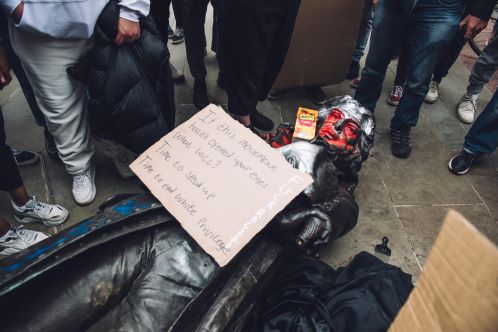THE TOPPLED statue of slave trader Edward Colston could be moved into a major museum.
The controversial statue was pulled down and dumped into Bristol’s harbour during a Black Lives Matter protest in 2020. It was moved into Bristol’s M Shed Museum where it has been out of public view since January 2022.
But now Bristol City Council has applied for permission to place the Grade II listed statue permanently in the M Shed.
Mayor of Bristol Marvin Rees told The BBC: “I remain in support of the view that the best place for the statue is in a museum where its context, and that of what it represents to many communities can be appropriately shared with diverse audiences.”
If the proposal is approved, the statue will be part of the M Shed’s upcoming protest-themed exhibition, which is expected to open next month.
Edward Colston was a 17th Century investor in the Transatlantic slave trade.
‘Reparations’
In December, the University of Bristol announced it would change its logo to remove any representation of Colston. Although the university received no funding from Colston, who died nearly 200 years before it was founded, his personal emblem – the dolphin – formed part of the institution’s crest and modern logo.
Its plans are part of the university’s £10 million ‘reparations’ project to tackle racial inequality and injustice within the University itself and in local communities.
Under these new plans, anyone who profited from the horrors of slavery cannot have a building named after them.
Vice-Chancellor and President, Professor Evelyn Welch, said: “I would like to thank everyone who took the time to respond to our survey both online and at in-person sessions, including several powerful and impactful events that were led by local Bristol communities of African and Caribbean descent.
“Throughout, I heard many distressing stories from those who had experienced racism and racist behaviours while engaging with, working at, or studying at the University of Bristol. What began as a consultation on our history and building renaming became a powerful platform to expose deep hurt and frustration with our slow progress and commitment to racial equity.
“I am deeply sorry for these damaging and hurtful experiences which continue to the present day, and I apologise to everyone impacted by those injustices. We aspire to be an inclusive institution and we must do better.”


Comments Form